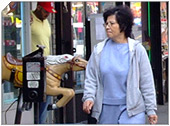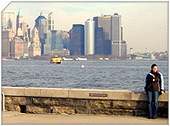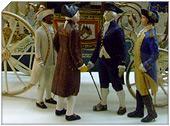Getting Started
Index
NYC Neighborhoods
Manhattan
Brooklyn
Queens
Bronx
Staten Island
NYC Icons
Chrysler Building
Flatiron Building
Empire State Building
Safe NYC
NYPD
FDNY
NYC Weather
NYC Climate
NYC Weather Forecast
Winter Season
Spring Season
summer Season
Fall Season
NYC History & Politics
New York City History
Tammany Hall and Politics
New York City Politicians
New York City Personalities
Culture of Gotham City
Culture of the city
Cultural diversity
City in popular culture
|
Michael Rubens Bloomberg (born 14 February 1942) is an American businessman, philanthropist, and the founder of Bloomberg L.P., currently serving as the Mayor of New York City. He was a general partner at Salomon Brothers before founding the financial software service company in 1981. Although a lifelong Democrat, he ran on the Republican ballot and was elected mayor in 2001, and was reelected to a second term in 2005. He is frequently mentioned as a possible independent candidate for the 2008 presidential election and fueled that speculation when he left the Republican Party in June 2007.
Policies as mayor
Bloomberg has said he wants reforming public education to be the legacy of his first term and addressing poverty to be the legacy of his second. He is known as a political pragmatist and for a managerial style that reflects his experience in the private sector. Bloomberg has chosen to apply a statistical, results-based approach to city management, appointing city commissioners based on their expertise and granting them wide autonomy in their decision-making. Breaking with 190 years of tradition, Bloomberg implemented a "bullpen" open office plan, reminiscent of a Wall Street trading floor, in which dozens of aides and managerial staff are seated together in a large chamber. The design is intended to promote accountability and accessibility.
Bloomberg's first mayoralty coincided with a major shift of authority over the city's public school system from the state government to the city government. From 1968 until 2000, New York City's schools were managed by the Board of Education, which was comprised of seven members. Only two of the seven were appointed by the mayor, which meant the City had a minority of representatives on the board and the mayor's ability to shape education policy was greatly diminished. In addition to the Board, 25 local school boards also played a part in running the system. In 2000, the local boards and Board of Education were abolished and replaced with a new mayoral agency, the Department of Education.
Bloomberg appointed Joel Klein as Schools Chancellor to run the new department, which was based at the renovated Tweed Courthouse near City Hall. Under Bloomberg and Chancellor Klein, test scores have risen and the City has obtained a higher percentage of funding from the state budget. Bloomberg opposes social promotion, and favors after-school and summer-school programs to help schoolchildren catch up, rather than allowing them to advance to the next grade level where they may be unprepared. Despite often tense relations with teachers' unions, he avoided a teacher strike by concluding a contract negotiation in which teachers received an average raise of 15% in exchange for givebacks and productivity increases.
Bloomberg has enforced a strengthened cell-phone ban in city schools that had its roots dating to a 1988 school system ban on pagers. The ban is controversial among some parents, who are concerned with their ability to contact their children. Administration representatives have noted that students are distracted in class by cell phones and often use them inappropriately, in some instances sending and receiving text messages, taking photographs, surfing the Internet, and playing video games, and that cell-phone bans exist in other cities including Detroit and Philadelphia.
On May 27, 2007 Mayor Michael Bloomberg announced that the four-year high school graduation rate in New York City has reached 60%, the highest level since the City began calculating the rate in 1986 and an 18% increase since the Mayor assumed control of the public schools in 2002.
Bloomberg supports the legalization of same-sex marriage in New York. Reflecting this, he appealed a decision finding the limiting of same-sex marriage unconstitutional. "My personal opinion is that anybody should be allowed to marry anybody. I don't happen to think we should put restrictions on who you should marry.... What the city doesn't want to have happen is people getting a marriage license and then six months, or one year later, or two years later, finding out it's meaningless," he has said.
Bloomberg has donated millions of dollars to the Johns Hopkins Bloomberg School of Public Health and appointed Dr. Thomas R. Frieden, an epidemiologist with a reputation for activism and scientific rigor, to be his Health Commissioner. Under Frieden the city Health Department has made HIV, diabetes and hypertension priorities.
Bloomberg extended New York City's smoking ban to all commercial establishments, including bars and nightclubs. This reform removed the last indoor public areas in which one could smoke in the city. The smoking ban took effect in March 2003. Bloomberg's smoking ban was considered trend-setting and many municipalities in North America and Europe have subsequently enacted similar bans.
In June 2005 Bloomberg signed the Potty Parity bill requiring more women's toilets in newly opened public places such as bars, theaters, stadiums and convention facilities
On 5 December 2006, New York became the first city in the United States to ban trans-fat from all restaurants. It will go into effect in July of 2008.
Bloomberg is one of the most active big city mayors in the issue of the environment. On April 22, 2007 he announced PLANYC: an aggressive program to achieve vastly improve New York City's environmental sustainability by 2030. On May 23, 2007 Bloomberg announced that by 2012 all of the city's Yellow Cabs will be hybrid cars. PLANYC aims to improve the city's sustainability through a multi-pronged approach that includes, among other things, the adoption of traffic congestion pricing based upon a system currently in effect in London and Singapore. Bloomberg contends this measure will reduce pollution and traffic congestion while raising revenue for the city. He has also pledged to plant one million trees in New York City, which will clean the air and boost property values.
Bloomberg is a supporter of immigration reform to secure the rights of illegal immigrants, who comprise a large part of the population of New York City. He argues that deportation breaks up families and scares illegal immigrants away from cooperating with law enforcement or accessing vital social services; as such, he supports proposals like those put forth by U.S. Senators Ted Kennedy and John McCain, which would normalize the status of otherwise law-abiding illegal immigrants already present. Bloomberg also believes that border enforcement is somewhat futile. He told the US Senate Judiciary Committee Field Hearing on Federal Immigration Legislation on 5 July 2006: "It is as if we expect border control agents to do what a century of communism could not: Defeat the natural forces of supply and demand and defeat the natural human instinct for freedom and opportunity. You might as well sit on the beach and tell the tide not to come in."
He also issued Executive Order 41 on 17 September 2003 which instructs city employees not to ask nor to disclose information about immigration status unless required by law or organizational mission.
During Bloomberg's tenure, the reduction of crime that began near the end of Mayor David Dinkins's tenure has continued. Bloomberg's approach to the issue has been more low-key than that of Giuliani, who was often criticized by advocates for the homeless and civil rights groups. However, there exists some criticism that the reduced-crime statistics are frequently falsified or doctored to exaggerate the reduction.
Since 2003, Bloomberg has become increasingly assertive in demanding that federal homeland security funds be distributed to municipalities based on risk - such as New York City - and population rather than any other measure. In an appearance before the United States Senate he argued that federal security funds should not be indiscriminately distributed, spread like "peanut butter."
Bloomberg came into office with a view that technology could not only make New York City government more efficient and responsive, but more transparent as well. His first major technology initiative was the consolidation of the City of New York's thousands of individual agency phone numbers into one three-digit number, 3-1-1. Bloomberg felt that a single phone number would be easy for New Yorkers to remember. The 311 deployment was of such importance that he assigned his daughter, Emma Bloomberg, to work closely with Commissioner Gino P. Menchini of the Department of Information Technology and Telecommunications (DoITT) to ensure that the project moved along swiftly. With his daughter on board, he felt many of the typical institutional obstacles that hinder rapid progress in a large bureaucracy like New York City would be removed. Although the project was greeted with skepticism, in 2003, 311 went live and it has since become one of the hallmark achievements of the Bloomberg Administration. In June of 2007, 311 received its 50 millionth call.
Another of Bloomberg's technology initiatives was the creation of NYC TV. By virtue of the franchise agreements with the cable operators, New York City had always had access to valuable spectrum on local cable providers Cablevision and Time Warner Cable, but had made little use of the channels. Upon taking office in 2002, Bloomberg tapped two former campaign aides, Arick Wierson and Seth Unger, to revamp the City's cable channels. In 2003, Bloomberg unveiled their creation, a network called NYC TV. These two young executives' innovation was that, unlike typical municipal channels, NYC TV would be focused on local lifestyle and events, parks, history and culture. Some members of the New York City Council initially criticized the network for being overly preoccupied with ratings. Nonetheless, the network gained early traction, most notably for its coverage of the local fashion industry. Since its inception, NYC TV has gone on to absorb local broadcaster WNYE-TV and has emerged as the largest local broadcast network in the New York region with one full power broadcast station, five cable stations, and one FM Radio station. Today all these entities are organized under the name NYC Media Group. By many regards, Bloomberg's belief that NYC TV could reinvent the local television landscape has held true. In 2006, WNBC entered into a large syndication agreement to air over 100 hours of NYC TV's original shows. The network has won over 20 New York Emmys since its inception, and series such as "Secrets of New York" are being distributed nationally on PBS, DiSH Network, airlines and overseas.
|
New York City Search
Quick NYC
|



 New York Weather Forecast
New York Weather Forecast
 Ethnic composition
Ethnic composition


















